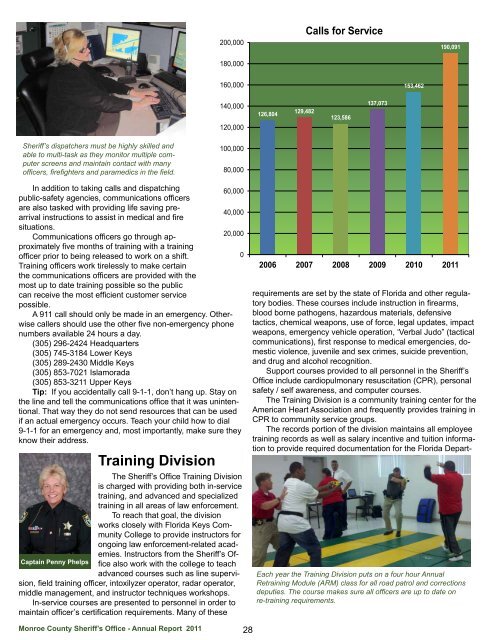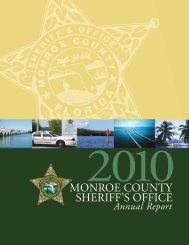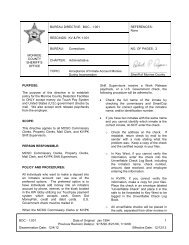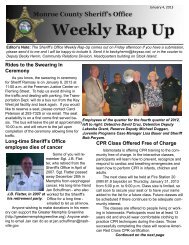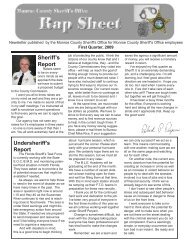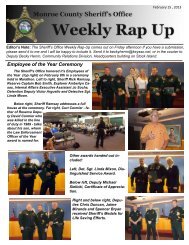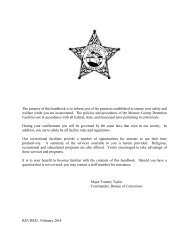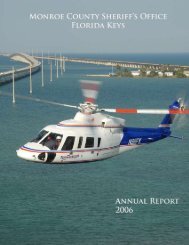Annual Report, Year 2011 - Monroe County Sheriff's Office
Annual Report, Year 2011 - Monroe County Sheriff's Office
Annual Report, Year 2011 - Monroe County Sheriff's Office
Create successful ePaper yourself
Turn your PDF publications into a flip-book with our unique Google optimized e-Paper software.
200,000<br />
180,000<br />
Calls for Service<br />
190,091<br />
160,000<br />
153,462<br />
140,000<br />
120,000<br />
126,804<br />
129,482<br />
123,586<br />
137,073<br />
Sheriff’s dispatchers must be highly skilled and<br />
able to multi-task as they monitor multiple computer<br />
screens and maintain contact with many<br />
officers, firefighters and paramedics in the field.<br />
100,000<br />
80,000<br />
In addition to taking calls and dispatching<br />
60,000<br />
public-safety agencies, communications officers<br />
are also tasked with providing life saving prearrival<br />
instructions to assist in medical and fire<br />
40,000<br />
situations.<br />
Communications officers go through approximately<br />
five months of training with a training<br />
20,000<br />
officer prior to being released to work on a shift.<br />
0<br />
Training officers work tirelessly to make certain<br />
the communications officers are provided with the<br />
most up to date training possible so the public<br />
can receive the most efficient customer service<br />
possible.<br />
A 911 call should only be made in an emergency. Otherwise<br />
callers should use the other five non-emergency phone<br />
numbers available 24 hours a day.<br />
(305) 296-2424 Headquarters<br />
(305) 745-3184 Lower Keys<br />
(305) 289-2430 Middle Keys<br />
(305) 853-7021 Islamorada<br />
(305) 853-3211 Upper Keys<br />
Tip: If you accidentally call 9-1-1, don’t hang up. Stay on<br />
the line and tell the communications office that it was unintentional.<br />
That way they do not send resources that can be used<br />
if an actual emergency occurs. Teach your child how to dial<br />
9-1-1 for an emergency and, most importantly, make sure they<br />
know their address.<br />
Training Division<br />
The Sheriff’s <strong>Office</strong> Training Division<br />
is charged with providing both in-service<br />
training, and advanced and specialized<br />
training in all areas of law enforcement.<br />
To reach that goal, the division<br />
works closely with Florida Keys Community<br />
College to provide instructors for<br />
ongoing law enforcement-related academies.<br />
Instructors from the Sheriff’s <strong>Office</strong><br />
also work with the college to teach<br />
Captain Penny Phelps<br />
advanced courses such as line supervision,<br />
field training officer, intoxilyzer operator, radar operator,<br />
middle management, and instructor techniques workshops.<br />
In-service courses are presented to personnel in order to<br />
maintain officer’s certification requirements. Many of these<br />
2006 2007 2008 2009 2010 <strong>2011</strong><br />
requirements are set by the state of Florida and other regulatory<br />
bodies. These courses include instruction in firearms,<br />
blood borne pathogens, hazardous materials, defensive<br />
tactics, chemical weapons, use of force, legal updates, impact<br />
weapons, emergency vehicle operation, ‘Verbal Judo” (tactical<br />
communications), first response to medical emergencies, domestic<br />
violence, juvenile and sex crimes, suicide prevention,<br />
and drug and alcohol recognition.<br />
Support courses provided to all personnel in the Sheriff’s<br />
<strong>Office</strong> include cardiopulmonary resuscitation (CPR), personal<br />
safety / self awareness, and computer courses.<br />
The Training Division is a community training center for the<br />
American Heart Association and frequently provides training in<br />
CPR to community service groups.<br />
The records portion of the division maintains all employee<br />
training records as well as salary incentive and tuition information<br />
to provide required documentation for the Florida Depart-<br />
Each year the Training Division puts on a four hour <strong>Annual</strong><br />
Retraining Module (ARM) class for all road patrol and corrections<br />
deputies. The course makes sure all officers are up to date on<br />
re-training requirements.<br />
<strong>Monroe</strong> <strong>County</strong> Sheriff’s <strong>Office</strong> - <strong>Annual</strong> <strong>Report</strong> <strong>2011</strong><br />
28


